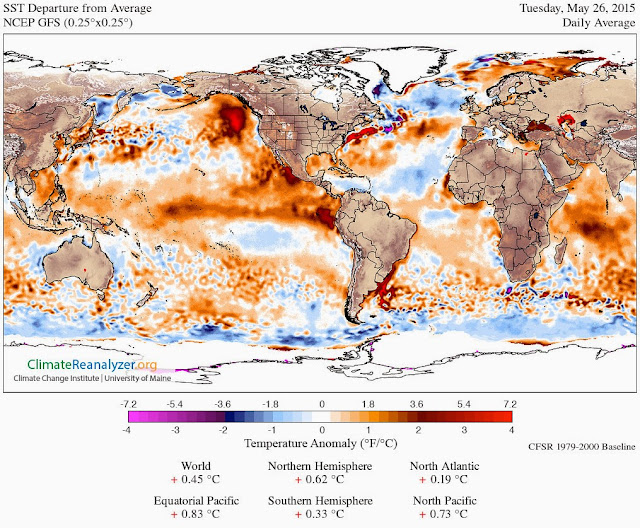Jason Soon linked
to an article about this last week, but I see
more writers are commenting about the promotion of a carbon tax by an American libertarian Jerry Taylor. He's gone and set up his own
think tank and his proposal is for
a revenue neutral carbon tax that gradually rises. In other words, it does not result in greater government retained revenue (hence is supposed to be libertarian friendly.) And the political deal is that this is done in replacement of Obama's attempt to reduce carbon burning by regulating the power industry via the EPA.
I have a few immediate observations:
1. James Hansen, the (I think) registered Republican (how he can live with himself on that matter I don't know) granddaddy scientist of climate change has been promoting the same idea
since at least 2009, possibly earlier. Are window licking Tea Party Republican types going to suddenly agree that he had a good idea all along? I don't think so...
2. I see that even Republican hero for stating the obvious and then taking it too far (Arthur Laffer) and Republican representative Bob Inglis have also been suggesting this
since at least 2008.
3. Jason may recall a thread from Catallaxy years ago in which he, Sinclair Davidson and I had some exchanges about this, and Sinclair acknowledged that if you had to do something about climate change, a revenue neutral carbon tax would be the preferable way to do it. I'm pretty sure that I said that one practical problem I could see was how to match the level of tax to the desired target of reductions, likely meaning some continual fiddling with the rate of the tax leading to investment uncertainties that business dislikes. (On the other hand, it is less liable to the rorting involved in cap and trade scheme offsets which may prove to be off dubious value - planting a bunch of trees that go up in a forest fire in decade's time, for example, or paying for no forest clearing in a country where poor law enforcement means it happens anyway.)
4. Sinclair Davidson then wrote in
2014 [2010 - the IPA confused me by having two publications both called "Climate Change - The Facts"] in the IPA's short collection of essays by climate change denialists/lukewarmers, based on the "climategate" emails:
...we can have no confidence in the observations that temperature has increased due to human activity because the mechanisms of science have been subverted.
So his attitude: problem? what problem?; and I'll throw my weight behind trying to convince the public there's no problem.
5. There is considerable uncertainty in terms of modelling about its effects. I think there was a good exchange between Taylor and an economist on his website about this, but I haven't found it again, yet.
This article looks more broadly at the question from a "progressive" point of view, and I think makes some decent points. Certainly, I would be skeptical of some
incredibly optimist forecasts for its effects as cited in The Guardian, even if it would seem the
British Columbian example has some positive reviews.
My initial conclusion is therefore:
a. good on Taylor for actually believing science and not taking the libertarian "denial or lukewarmer" line. Good on him for pointing out the obvious about the "free rider" aspect, that if large, rich economies do nothing to institute this, developing economies have no clear reason to either.
b. as the idea has been around for quite a while now, the problem is not that it theoretically appeals to libertarians, even the likes of Sinclair Davidson - the problem is the degree to which the great bulk of libertarians have adopted multipronged denialism/do-nothing-ism, and not moved an inch from the position that there is no problem worth addressing. The proposal is going no where until that changes.
c. the requirement of "revenue neutrality" is an unwarranted ideological add on that puts one aspect of a carbon tax less useful that it could otherwise be, in that internationally governments are scratching around looking at revenue sources and the problems of corporate tax minimisation. I don't see why this should be a strict condition on the implementation of a carbon tax, even if the bulk of it is used to reduce other taxes.










And I like the sentiment, to a degree, although the reference to "perversion" makes one suspect the writer is perhaps just a little more intolerant than needed:
Finally:
Ah, zoning laws!
That raises another topic on which certain commentators have an excessive obsession. I've got a post coming about that too.
* I felt bad about the earlier title, since I hate the sound of the anyone saying "oh, he's a gay" as if that was the crucial identifier for any personality.